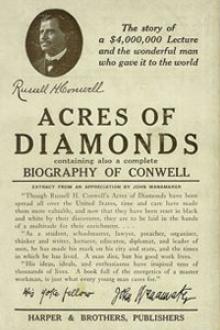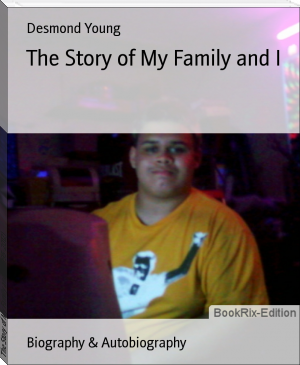Acres of Diamonds - Russell H. Conwell (big screen ebook reader .txt) 📗

- Author: Russell H. Conwell
- Performer: 1599869802
Book online «Acres of Diamonds - Russell H. Conwell (big screen ebook reader .txt) 📗». Author Russell H. Conwell
RUSSELL H. CONWELL
AN Autobiography! What an absurd request!
If all the conditions were favorable, the story of my public Life could not be made interesting.
It does not seem possible that any will care to read so plain and uneventful a tale. I see nothing in it for boasting, nor much that could be helpful.
Then I never saved a scrap of paper intentionally concerning my work to which I could refer, not a book, not a sermon, not a lecture, not a newspaper notice or account, not a magazine article, not one of the kind biographies written from time to time by noble friends have I ever kept even as a souvenir, although some of them may be in my library. I have ever felt that the writers concerning my life were too generous and that my own work was too hastily done. Hence I have nothing upon which to base an autobiographical account, except the recollections which come to an overburdened mind.
My general view of half a century on the lecture platform brings to me precious and beautiful memories, and fills my soul with devout gratitude for the blessings and kindnesses which have been given to me so far beyond my deserts.
So much more success has come to my hands than I ever expected; so much more of good have I found than even youth’s wildest dream included; so much more effective have been my weakest endeavors than I ever planned or hoped—
that a biography written truthfully would be mostly an account of what men and women have done for me.
I have lived to see accomplished far more than my highest ambition included, and have seen the enterprises I have undertaken rush by me, pushed on by a thousand strong hands until they have left me far behind them. The realities are like dreams to me. Blessings on the loving hearts and noble minds who have been so willing to sacrifice for others’ good and to think only of what they could do, and never of what they should get!
Many of them have ascended into the Shining Land, and here I am in mine age gazing up alone, _Only waiting till the shadows
Are a little longer grown_.
Fifty years! I was a young man, not yet of age, when I delivered my first platform lecture.
The Civil War of 1861-65 drew on with all its passions, patriotism, horrors, and fears, and I was studying law at Yale University. I had from childhood felt that I was “called to the ministry.”
The earliest event of memory is the prayer of my father at family prayers in the little old cottage in the Hampshire highlands of the Berkshire Hills, calling on God with a sobbing voice to lead me into some special service for the Saviour. It filled me with awe, dread, and fear, and I recoiled from the thought, until I determined to fight against it with all my power. So I sought for other professions and for decent excuses for being anything but a preacher.
Yet while I was nervous and timid before the class in declamation and dreaded to face any kind of an audience, I felt in my soul a strange impulsion toward public speaking which for years made me miserable. The war and the public meetings for recruiting soldiers furnished an outlet for my suppressed sense of duty, and my first lecture was on the “Lessons of History” as applied to the campaigns against the Confederacy.
That matchless temperance orator and loving friend, John B. Gough, introduced me to the little audience in Westfield, Massachusetts, in 1862.
What a foolish little school-boy speech it must have been! But Mr. Gough’s kind words of praise, the bouquets and the applause, made me feel that somehow the way to public oratory would not be so hard as I had feared.
From that time I acted on Mr. Gough’s advice and “sought practice” by accepting almost every invitation I received to speak on any kind of a subject. There were many sad failures and tears, but it was a restful compromise with my conscience concerning the ministry, and it pleased my friends.
I addressed picnics, Sunday-schools, patriotic meetings, funerals, anniversaries, commencements, debates, cattle-shows, and sewing-circles without partiality and without price. For the first five years the income was all experience. Then voluntary gifts began to come occasionally in the shape of a jack-knife, a ham, a book, and the first cash remuneration was from a farmers’ club, of seventy-five cents toward the “horse hire.”
It was a curious fact that one member of that club afterward moved to Salt Lake City and was a member of the committee at the Mormon Tabernacle in 1872 which, when I was a correspondent, on a journey around the world, employed me to lecture on “Men of the Mountains” in the Mormon Tabernacle, at a fee of five hundred dollars.
While I was gaining practice in the first years of platform work, I had the good fortune to have profitable employment as a soldier, or as a correspondent or lawyer, or as an editor or as a preacher, which enabled me to pay my own expenses, and it has been seldom in the fifty years that I have ever taken a fee for my personal use.
In the last thirty-six years I have dedicated solemnly all the lecture income to benevolent enterprises. If I am antiquated enough for an autobiography, perhaps I may be aged enough to avoid the criticism of being an egotist, when I state that some years I delivered one lecture, “Acres of Diamonds,” over two hundred times each year, at an average income of about one hundred and fifty dollars for each lecture.
It was a remarkable good fortune which came to me as a lecturer when Mr. James Redpath organized the first lecture bureau ever established.
Mr. Redpath was the biographer of John Brown of Harper’s Ferry renown, and as Mr. Brown had been long a friend of my father’s I found employment, while a student on vacation, in selling that life of John Brown. That acquaintance with Mr.
Redpath was maintained until Mr. Redpath’s death. To General Charles H. Taylor, with whom I was employed for a time as reporter for the Boston Daily Traveler, I was indebted for many acts of self-sacrificing friendship which soften my soul as I recall them. He did me the greatest kindness when he suggested my name to Mr.
Redpath as one who could “fill in the vacancies in the smaller towns” where the “great lights could not always be secured.”
What a glorious galaxy of great names that original list of Redpath lecturers contained!
Henry Ward Beecher, John B. Gough, Senator Charles Sumner, Theodore Tilton, Wendell Phillips, Mrs. Mary A. Livermore, Bayard Taylor, Ralph Waldo Emerson, with many of the great preachers, musicians, and writers of that remarkable era. Even Dr. Holmes, John Whittier, Henry W. Longfellow, John Lothrop Motley, George William Curtis, and General Burnside were persuaded to appear one or more times, although they refused to receive pay. I cannot forget how ashamed I felt when my name appeared in the shadow of such names, and how sure I was that every acquaintance was ridiculing me behind my back. Mr. Bayard Taylor, however, wrote me from the Tribune office a kind note saying that he was glad to see me “on the road to great usefulness.” Governor Clafflin, of Massachusetts, took the time to send me a note of congratulation.
General Benjamin F. Butler, however, advised me to “stick to the last” and be a good lawyer.
The work of lecturing was always a task and a duty. I do not feel now that I ever sought to be an entertainer. I am sure I would have been an utter failure but for the feeling that I must preach some gospel truth in my lectures and do at least that much toward that ever-persistent “call of God.” When I entered the ministry (1879) I had become so associated with the lecture platform in America and England that I could not feel justified in abandoning so great a field of usefulness.
The experiences of all our successful lecturers are probably nearly alike. The way is not always smooth. But the hard roads, the poor hotels, the late trains, the cold halls, the hot church auditoriums, the overkindness of hospitable committees, and the broken hours of sleep are annoyances one soon forgets; and the hosts of intelligent faces, the messages of thanks, and the effects of the earnings on the lives of young college men can never cease to be a daily joy. God bless them all.
Often have I been asked if I did not, in fifty years of travel in all sorts of conveyances, meet with accidents. It is a marvel to me that no such event ever brought me harm. In a continuous period of over twenty-seven years I delivered about two lectures in every three days, yet I did not miss a single engagement. Sometimes I had to hire a special train, but I reached the town on time, with only a rare exception, and then I was but a few minutes late. Accidents have preceded and followed me on trains and boats, and were sometimes in sight, but I was preserved without injury through all the years. In the Johnstown flood region I saw a bridge go out behind our train. I was once on a derelict steamer on the Atlantic for twenty-six days. At another time a man was killed in the berth of a sleeper I had left half an hour before. Often have I felt the train leave the track, but no one was killed.
Robbers have several times threatened my life, but all came out without loss to me. God and man have ever been patient with me.
Yet this period of lecturing has been, after all, a side issue. The Temple, and its church, in Philadelphia, which, when its membership was less than three thousand members, for so many years contributed through its membership over sixty thousand dollars a year for the uplift of humanity, has made life a continual surprise; while the Samaritan Hospital’s amazing growth, and the Garretson Hospital’s dispensaries, have been so continually ministering to the sick and poor, and have done such skilful work for the tens of thousands who ask for their help each year, that I have been made happy while away lecturing by the feeling that each hour and minute they were faithfully doing good. Temple University, which was founded only twenty-seven years ago, has already sent out into a higher income and nobler life nearly a hundred thousand young men and women who could not probably have obtained an education in any other institution. The faithful, self-sacrificing faculty, now numbering two hundred and fifty-three professors, have done the real work. For that I can claim but little credit; and I mention the University here only to show that my “fifty years on the lecture platform”
has necessarily been a side line of work.
My best-known lecture, “Acres of Diamonds,”
was a mere accidental address, at first given before a reunion of my old comrades of the Forty-sixth Massachusetts Regiment, which served in the Civil War and in which I was captain. I had no thought of giving the address again, and even after it began to be called for by lecture committees I did not dream that I should live to deliver it, as I now have done, almost five thousand times. “What is the secret of its popularity?”





Comments (0)